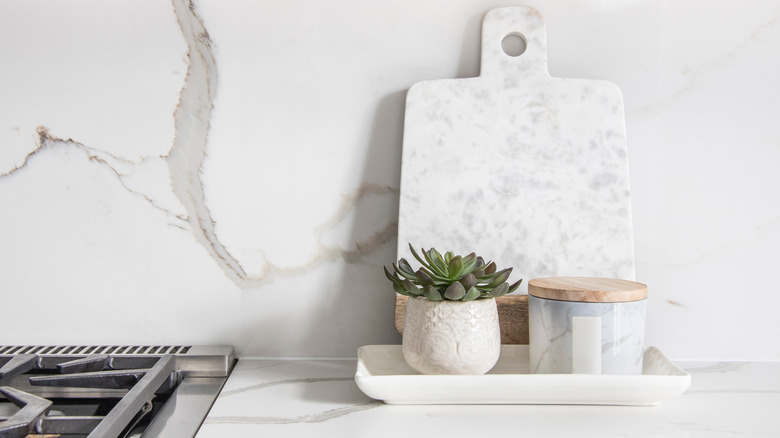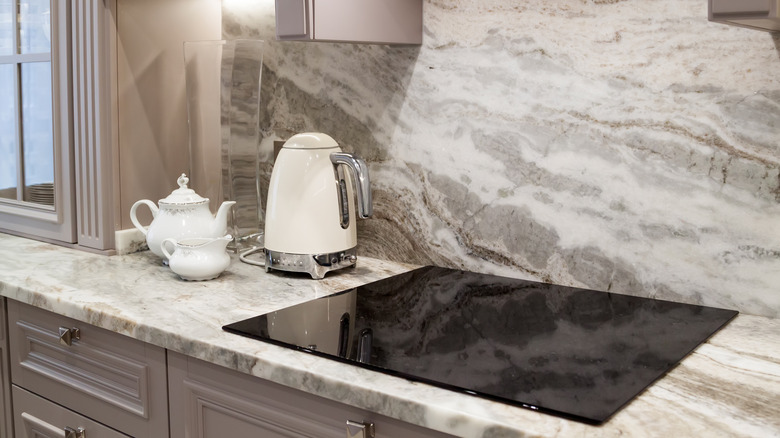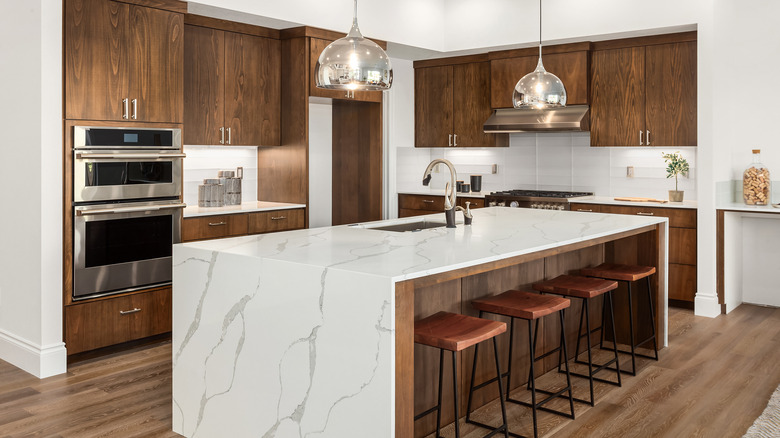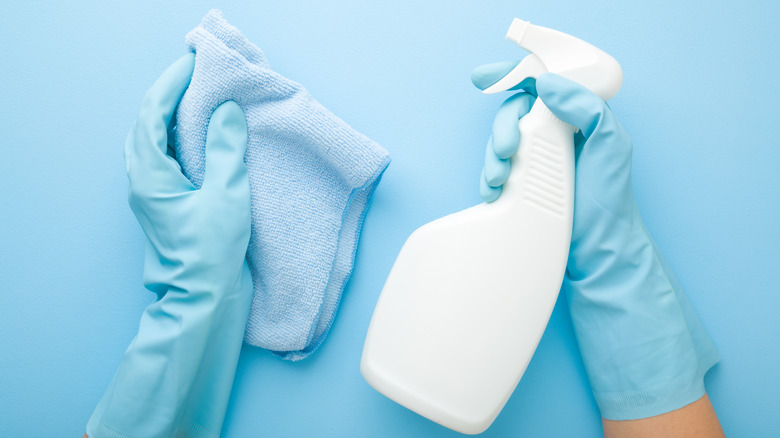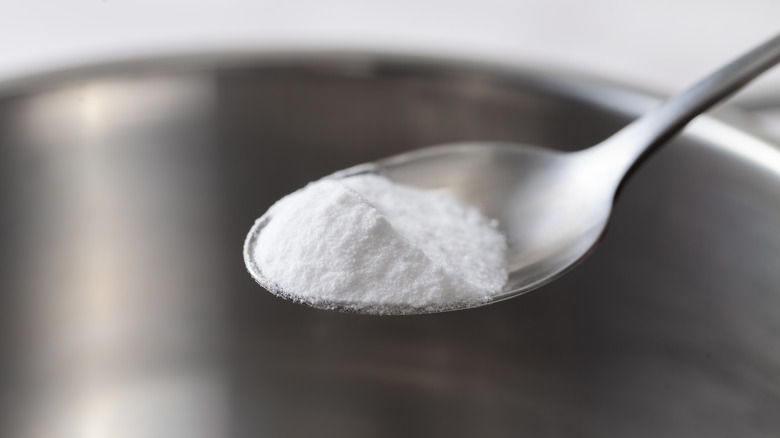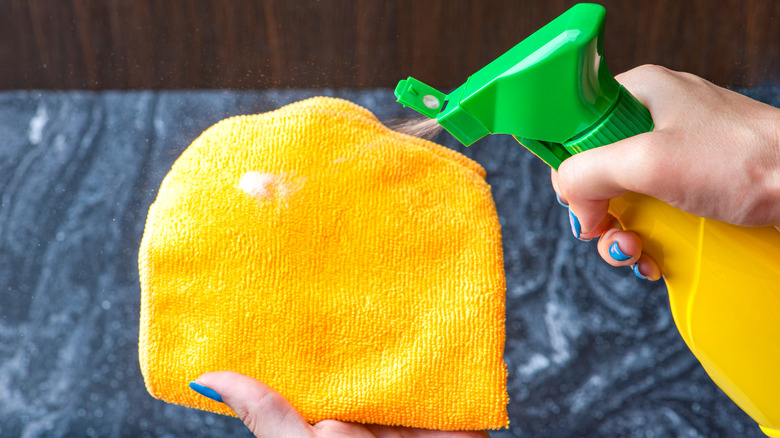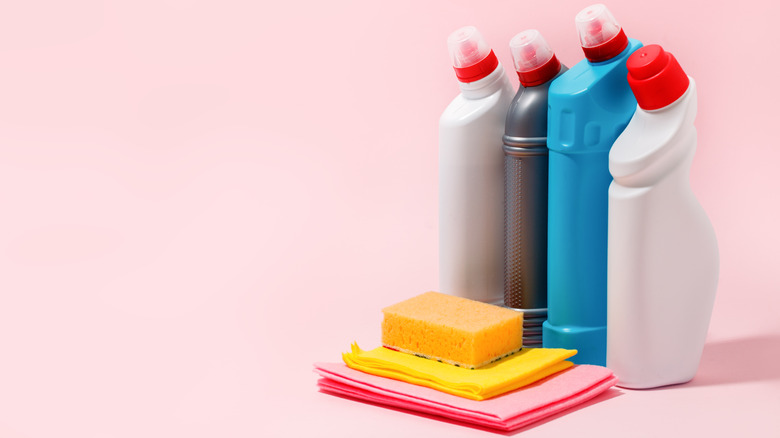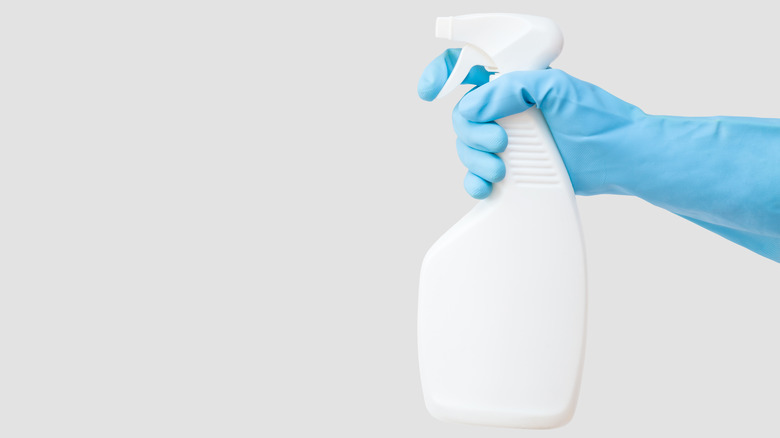The Best Way To Clean Quartz Countertops
Cleaning your quartz countertops doesn't have to be hard; the best way to clean quartz is also the easiest. With the right products, all you need to worry about is quickly cleaning up spills. The quartz countertops that most people have in their homes are actually quartzite, which is a porous natural stone, according to Academy Marble and Granite. Because quartzite is porous, spills have the potential to sink in and stain.
Keeping a quartz counter clean includes everyday upkeep that can take anywhere from one minute to two days depending on how stained and dirty a counter is. It is important to clean quartz counters because if not, vinegar, citrus, or soda spills will cut through and damage the sealant. Additionally, stains can become permanent if left untouched, and the stone can be damaged with chips or scratches (via The Granite Place).
The best way to clean quartz includes items you most likely already have on hand, water, and a mild soap like dish soap. A microfiber cloth is preferred, but paper towels work just as well. You may also need a commercial quartz cleaner or baking soda if you have tough stains.
What to not use
To not permanently damage your quartz counters, it's important to stay away from some everyday cleaners. Cleansers that have bleach, ammonia, or that are acid-based will wear down the sealant and should not be used, according to The Granite Place. This includes Windex, Lysol wipes, and homemade vinegar cleansers, just to name a few.
What you're looking for in a cleaner is one that has a low pH and is non-abrasive. Rock With Us explains that in a pinch you can use these products if you dilute them with water, but in the long run, it isn't a good idea. You will have to reseal your counter more often if you use these products and damage your quartz. Abrasive sponges should also not be used because they can scratch the quartz if the sealant has not been redone. Additionally, you should stay away from using steel wool, Brillo pads, and the rough side of kitchen sponges. Ideally, you would use a soft microfiber cloth.
Seal your quartz counter
Applying a sealant to your quartz countertop is a very important step in caring for your counter; it will protect the quartz and keep it looking brand new for many years. Quartz is naturally porous so the sealant will prevent spills from becoming permanent stains. It will also protect quartz counters from chips and scratches.
When your quartz counter is first installed it will be sealed. After that, it is up to you when to reseal it, but it is recommended you reseal anywhere from twice a year to every year, according to Eagle Stones USA. It all depends on how much wear and tear you put on your counter and if you have been using or spilling things that are acidic like lemon juice, orange juice, vinegar, wine, and soda. If you're looking to wait more than a year before resealing your quartz counter, Marble Unlimited recommends choosing a natural stone-safe sealer made from silicone; otherwise, they recommend sealers made from polyurethane, acrylics, or natural waxes.
Dish soap and water
Using water and a mild detergent like dish soap is the best and easiest way to clean quartz countertops. It's strong enough to clean spills and isn't acidic, so it won't deteriorate the sealant or ruin the quartz counter. To make this cleaner, Tips Bulletin explains that you should mix 1 teaspoon of dish soap for every gallon of water. This cleanser is mild enough to use on everyday spills that should be wiped up as soon as possible, so they don't have time to settle into the porousness of quartz counters.
The easiest way to use this cleanser is to put the solution in a spray bottle to conveniently spray and wipe up spills for day-to-day use. You can also mix it in a bucket when you are doing more thorough cleanings, then soak your sponge or cloth in the soapy water, ring it out, and wipe down your counters. It's important to remember to thoroughly remove all the soapy water off your counters with fresh water so a film doesn't build up (via Academy Marble & Granite).
Poultice
Sometimes spills turn into stains before you get a chance to clean up. If this happens and the trusty water and dish soap cleanser isn't powerful enough, you can use a poultice. A poultice works by soaking up the stain from the quartz. You can either make a poultice or buy one for anywhere from less than $10 to $30 (per Home Depot). However, it is simple to make and likely that you already have what you need at home.
To make a poultice at home, mix together water and baking soda to make a thick paste, per Cosmo Surfaces. Take this paste and spread it over any stains you have. Then put saran wrap over the area and you can tape it down with painter's tape if the stain is in an area that is frequently used. Leave it for one to two days, depending on how tough the stain is. After, make sure to clean the area with your chosen cleanser, and it is recommended by Academy Marble to reseal that area to prevent future stains.
Isopropyl alcohol
When the dish soap and water cleaner is not enough you can take it a step up. By using an isopropyl alcohol mixture after cleaning with your dish soap and water cleaner, you can safely disinfect your quartz counters. It's important to not only clean your surfaces, but to disinfect them so there aren't any bacteria present.
To make the disinfectant, mix 1/4 cup of isopropyl alcohol with 2 cups of water and put it in a spray bottle, according to HGTV. Optionally, you can also add a couple drops of essential oil to add a nice smell and because some essential oils have antibacterial properties, according to Healthline. After cleaning your counters with the dish soap and water and wiping them down, thoroughly spray your counters with the isopropyl alcohol disinfectant and wait two to three minutes. Then wipe down your counters with a dry paper towel or cloth.
Commercial quartz cleaner
If you would rather not mix your own quartz countertop cleanser, then you can purchase a commercial cleanser specially made for quartz. It's important when buying a cleanser to make sure that it is formulated for cleaning quartz or natural stones. Stay away from all-purpose cleaners unless it specifies that it is safe to use on quartz. This would be a cleanser with a low pH, is non-abrasive, and is non-acidic.
These quartz cleansers usually come in the form of a spray bottle or wipes for your convenience. The Countertop Advisor explains that these cleansers are specially formulated to clean grease, oils, adhesives, and food from your countertops without damaging the quartz or sealant. Some of these cleansers even double as a quartz polish to keep your counter looking shiny and streak-free. Other quartz cleansers are also disinfectants, which is important to clean any bacteria, especially around where you prepare and consume food.
Goo Gone
There are some types of stains that need special treatment, like if kids use your quartz counter as a canvas for their art or if you spill something sticky like super glue. In cases like these where a poultice won't remove the stain, you can use Goo Gone. You can buy Goo Gone for around $5, as noted by Home Depot.
First, spray the Goo Gone on your stain and let it sit for five to ten minutes. Then wipe it off and clean the area with your soapy water or other chosen cleanser, being sure to remove all remnants of the Goo Gone and soap by rinsing with water. This will remove permanent marker and pen stains, super glue, and anything sticky, according to Love to Know and Granite Countertops Oregon. You just need to be sure that your quartz countertops have been resealed for the year before Goo Gone is safe to use on quartz.
